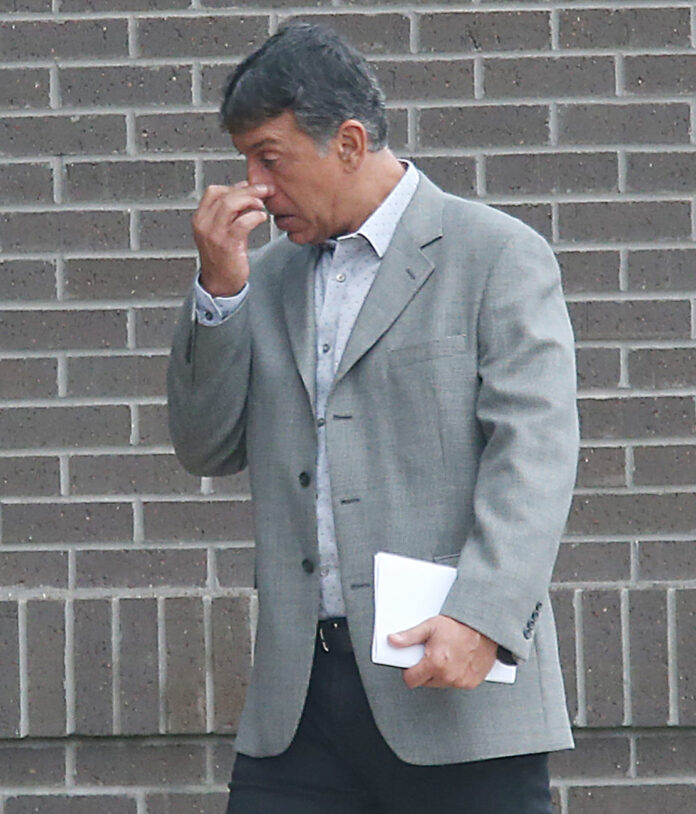McALLEN — The federal bribery case against a McAllen hotelier is on hold pending concerns that his defense attorney may have a conflict of interest in continuing to represent him.
Hotel owner and operator Sunil Wadhwani appeared in federal court Monday afternoon for what should have been a final pretrial conference before jury selection was slated to begin Tuesday; however, the case was temporarily derailed after federal prosecutors raised conflict concerns regarding Wadhwani’s attorney, Michael Wynne.
The issue superseded several others that could also have resulted in delays, including motions by the government to declare the case complex and to seek a continuance. Though the government’s motions remain under seal, some of their details came to light via responses Wynne filed Monday morning in opposition to the government’s efforts.
Wadhwani, together with Weslaco businessman Ricardo Quintanilla, is accused of paying bribes to then-Weslaco city officials in order to secure favorable economic incentive agreements related to a Motel 6 project.
In court Monday, the two sides presented their cases before U.S. District Judge Ricardo H. Hinojosa.
Assistant U.S. Attorney Roberto Lopez Jr. began by laying out the foundation for the government’s concerns, namely that Wynne may have divided loyalties due to his representation of certain former clients from whom he may have gained privileged information that could advantage him in this case, and issues regarding the perception that Wynne served as counsel for individuals he did not actually represent.
Regarding the latter, questions arose regarding whether Wynne had ever represented one of Wadhwani’s employees — his executive assistant and general contractor, Anil Uttamchandani. Named in several of the case documents, Uttamchandani has not been charged with any crime, though prosecutors did reveal he had been served with a “target letter.”
During its investigation of the case, the FBI paid an early morning visit to Uttamchandani, during which he declined to respond until he spoke with Wynne.
Prosecutors allege that Uttamchandani claimed Wynne was his attorney; however, Wynne argued that he merely referred Uttamchandani to another attorney, his former — and brief — law partner, Eric Cassidy, who was also in the courtroom Monday.
“He asked, ‘What do I do if the FBI knocks on my door?’” Wynne said of a prior conversation between him and Uttamchandani. “I gave him my card,” he said, telling the man to call him for an attorney recommendation.
Wynne and Cassidy partnered for approximately three weeks before dissolving the partnership at the end of October. That fact was an oddity the judge focused on for several minutes. And though the partnership no longer exists, the five motions Wynne filed Monday prior to the 4 p.m. hearing all bear a signature that reads “Gregor|Cassidy|Wynne PLLC.”
And the pair both showed up when Uttamchandani was being interviewed by the FBI, prosecutors said, though Wynne stepped away from the conversation early.
The question of who Wynne represented — or who it appeared he represented — continued as the two sides spoke of a series of subpoenas the government issued to several businesses owned by or related to Wadhwani.
As Wadhwani’s executive assistant, Uttamchandani served as a business records custodian. Wynne accepted service of the various subpoenas and relied on Uttamchandani to sift through records in order to fulfill the government’s request for documents, he said.
Wynne argued that the timing of his conversations with Uttamchandani — whether before or after the service of the subpoenas — affected the appearance of a conflict. The judge, however, disagreed. “If he felt — and you were somehow acting as — his lawyer, it doesn’t matter at what point,” the subpoenas were served, Hinojosa said.
The government also alleges Wynne is conflicted due to his prior representation of Daniel J. Garcia, a Rio Grande City-area attorney who is currently under indictment in the Weslaco water plant bribery case. Prosecutors have since linked the two schemes as related cases.
Wynne represented Garcia briefly at the beginning of the water plant investigation. The government alleges he may have unfairly gained privileged information as a result of that now defunct attorney/client relationship.
Wynne argued the relationship was so long ago he neither remembered details of his conversations with his former client, nor could he find notes from those encounters. He also argued that whatever knowledge he currently possesses he has obtained from the government’s own filings, or could easily obtain through other valid avenues.
After approximately a half hour of back-and-forth between the attorneys, Hinojosa spoke of how the specter of a potential conflict is serious, and that Wadhwani’s best interests would be better served if he had the advice of a neutral third party.
To that end, the judge asked federal public defender Richard Gould to analyze the issue and give Wadhwani his unvarnished opinion about whether he should continue to retain Wynne or seek alternate counsel, saying Gould’s only loyalty would be to “watch out for you.”
“We’re not doing anything else on this case until we solve this problem,” Hinojosa said, ending the hearing and dismissing the two sides.
Debates over the government’s requests to continue the case and declare it complex, and of Wynne’s request to have Wadhwani tried separately from his co-defendant will have to wait.




